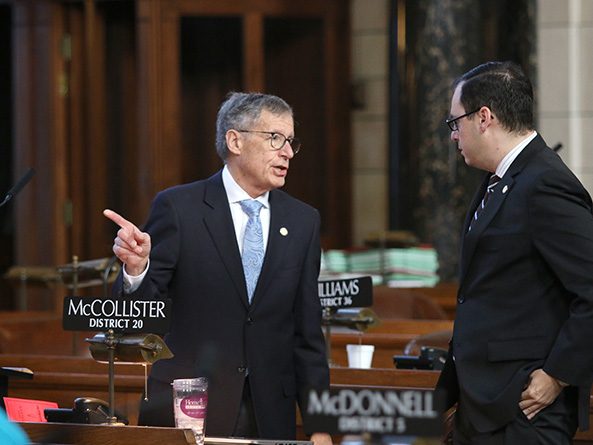Remote seller sales tax requirements advanced
Lawmakers gave first-round approval March 4 to a bill that would require internet retailers without a physical presence in Nebraska to collect and remit state sales tax on purchases made by Nebraska residents.

The U.S. Supreme Court ruled last June in South Dakota v. Wayfair that a state may require online retailers without a physical presence in the state to collect and remit state sales tax.
Omaha Sen. John McCollister, sponsor of LB284, said the ruling allows the Legislature finally to “level the playing field” for brick-and-mortar Nebraska businesses and online retailers that currently are not required to collect and remit state sales tax.
McCollister said the South Dakota law at question in the Wayfair case includes an exception for small retailers with sales of $100,000 or less or 200 or fewer annual transactions. LB284 would include this legal standard, which the Supreme Court found reasonable, he said.
As introduced, LB284 would require remote sellers exceeding either of those thresholds to collect and remit state sales tax. The bill also would require “multivendor marketplace platforms”—online marketplaces such as Amazon or Ebay—to collect and remit state sales tax for the smaller sellers they serve if the marketplaces exceed the thresholds.
The Legislative Fiscal Office has estimated that requiring remote sellers to collect and remit state sales tax would generate an additional $30 million to $40 million in revenue each year.
A Revenue Committee amendment, adopted 43-0, would replace the bill. McCollister said the amendment still would require remote sellers and multivendor marketplace platforms to collect and remit state sales tax if they exceed the thresholds in the previous or current calendar year. It also would address several technical issues, he said.
The amendment would require a retailer to obtain a permit from the state Department of Revenue and begin collecting sales tax on or before the first day of the second calendar month after it exceeds the threshold for the first time.
It also would change the bill’s effective date to April 1.
Sen. Tom Briese of Albion supported the committee amendment and the bill, saying it would expand Nebraska’s sales tax base and allow the state to more effectively enforce the collection of taxes that already are owed.
Briese said he would prefer that the bill direct any additional revenue to property tax relief.
“I will do everything possible going forward to ensure that the new revenue generated by post-Wayfair online sales tax collection ends up in the hands of our property taxpayers,” Briese said.
Sen. Lou Ann Linehan of Elkhorn also supported LB284, saying it is “critically important for the state.” She also would like to direct any new revenue to the property tax credit fund, but said the department has stated that it cannot precisely track tax revenue from internet sales.
Kearney Sen. John Lowe also supported the bill as amended, saying it would protect small retailers from the collection requirement. He said LB284 would not help brick-and-mortar businesses as much as suggested, however, because many Nebraskans shop online for convenience, not to avoid sales tax.
“I think that we’re barking at a tree that doesn’t have much fruit,” he said.
After adopting a technical amendment, senators voted 44-0 to advance the bill to select file.


